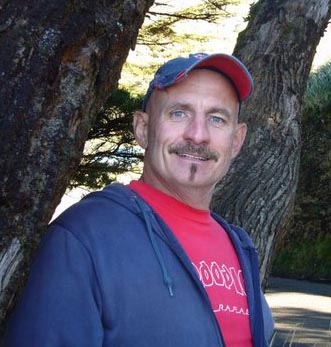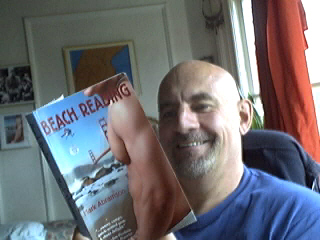 |
An Interview With Mark Abramson
Mark Abramson was a Midwestern farm boy who joined the great gay migration to San Francisco in the 1970s. His writing has appeared in the gay press as far back as Christopher Street , Fag Rag , Gay Sunshine , Mouth of the Dragon and more recently in Lethe Press' acclaimed anthology Charmed Lives, gay spirit in storytelling . Like Tim Snow, Mark Abramson grew up in Minnesota and once worked as a waiter in the Castro, but Mark is better known as a bartender and a co-producer with the late Jim Cvitanich of “ MEN BEHIND BARS, the bartenders' folly ” an annual AIDS benefit, as well as “ PIER PRESSURE” and “ HIGH TEA ” both mega-dance parties on the piers of San Francisco. What is your approach to writing a novel: that is, do you outline or not? Do you keep files and piles of notes? I don't usually outline, although I sometimes make a list of scenes in advance of writing them. I like to trust the characters to tell me where they're going without inhibiting them, almost in the style of “automatic writing.” Of course, on the other hand, sometimes the characters have to be disciplined a little or they either get lazy and want to lounge around the house all day or else they want to go off on a wild goose chase that has nothing to do with the story I want them to tell. What are some of the tricks, pitfalls, etc. that you need to keep in mind when writing a mystery novel/story? One trick is to write the last sentence/ scene/ paragraph/ page/ chapter before starting the book. I did that with “Neutriva Dreams” and it gave me a place to aim for, knowing where all the intrigue was going to end up. When I got to the end I realized I still needed to add a couple more chapters of to tie up the loose ends, but it was still a good way of writing that book. I wish I could do that more often. What is it that kick starts a project for you: a character, a situation, or…? It's usually a situation. I use most of the same characters in my Beach Reading series, although I do introduce at least one or two new characters in each book and they move the plot of that book and usually don't return. The situation is still more important. If a character kick starts a project, I have to know: What does that character intend to do? How will the existing characters interact with him/ her. What will they think of the new person in their midst. In some cases the new character is from the past, for example: Ruth's estranged daughter or Tim's alcoholic mother or his old baby-sitter who has been dead for years.
What inspired Beach Reading ? I was on my way to the beach and wanted a book to stick in my backpack, but I wanted it to be a book I was already familiar with. I wanted another book by someone whose work I had already knew, but there were no more. (I was a huge fan of The Hardy Boys when I was a kid.) I wanted another in the Nathan Aldyne series or one more of John Preston's Alex Kane books or another of Armistead's “Tales of the City” or even another Sue Grafton, but I had caught up with her alphabet. I got to thinking I should write a series of my own and make it “beach reading” – light, funny, entertaining and not too long or heavy. A good book for the beach doesn't tire you out from lugging it around or from holding the weight of it all afternoon. You have several novels planned in this series. Can you explain your approach to the characters as the series moves on? Will they develop and age, will they remain in a timeless situation? I'm not sure if they need to age, although I want each book to take place in the same general time frame as when it is released. I am trying to include elements of what's going on in the country and in the news as I ready each book for publication. The characters don't really need to age much, though. When you think of cartoon characters, like Dennis the Menace or Dagwood, they don't age. My characters aren't cartoon characters, but they're fun. What keeps you writing? What inspires you? My background was in music and theatre, but I always loved to write. In high school I wrote weird “Twilight Zone” sort of short-stories and essays. I always loved writing long letters, too. On my 18 th birthday I left the farm where I grew up to go on a concert tour of Europe and I started keeping a journal. The journal is still my first love and my best writing, as far as I'm concerned. Can you tell us a bit about your first published work (other than Beach Reading)? -- how did that come about? And how do you feel about it now, i.e. would you like to change it and how? I was a huge fan of Anne Sexton and the other suicides like Sylvia Plath and I published tons of poetry in my college and grad-school days. When I look back at it now it's pretty embarrassing. I wrote a bi-monthly column for a now defunct gay paper called “Castro Times” in the 80s. That was pretty bad too. In about 1978 I sold an article to Christopher Street called “Loving an Alcoholic” and in the following issue they printed a rebuttal to everything I said from an expert in alcoholism. He died between the time of my issue and his, so I couldn't even defend myself. How have you grown as a writer? I am more disciplined to write every day, whether that means working on something new or editing, polishing, expanding what I have written. What has gotten better? I am enjoying it more. What things have you dropped along the way? I try not to take myself too seriously in any avenue of life. What helped most in your growth as a writer? Reading the writing of people I respect. What are the three most important pieces of advice you'd give to writers?
How long does it generally take you to complete a novel – from conception to completion? The “Beach Reading” books are not exactly Tolstoy, right? The first draft of each of them took, on average, six months. I like to allow myself very free reign on the first draft. Then I set it aside a while and go work on something else, usually my diaries. Then I might go back and read the novel from front to back with a pen in hand, adding a lot of detail and cleaning it up. Getting from there to publication depends on how much time my editor has to work with me and how focused I am – at least several more weeks of re-writes with room to live a fairly normal life at the same time. What's the most difficult stage in the writing for you? The first page. Who are the authors who you admire most, who inspire you, whose writing you think is most beautiful, moving, exciting? Anne Tyler, Anne LaMott, John Irving, Fannie Flagg, and I would have to include writers who are/ were personal friends: John Preston, Patricia Hampl, Randy Shilts, Lewis DeSimone, Armistead Maupin, Kirk Read. What do you find most satisfying in a book: a great plot, beautiful writing, fully realized characters? Beautiful writing. In your own work, what do you think you are strongest at: plot, beautiful prose, character? Or something else? I think I'm strongest at dialogue. That probably comes from my musical background. And I like the humor in my books, but I'm most proud of my prose when it really sings. In “Beach Reading,” my friend George loved this paragraph the best: “She reminded me of someone, “Artie said. “No one in particular… you know what I mean? She's just the sort of person who's a stranger only once. Then every time she smiles she has the look of an old friend who shares a delicious secret.” I think that if a book is beautifully enough written, it almost shouldn't matter what it's about. I had no interest in horse racing, but I loved “Seabiscuit,” for example. Same with “Memoirs of a Geisha.” How do you plot a mystery or a thriller – what stymies you most, what do you find easiest? Finding the key into the story can be hard. There usually needs to be a conflict of some sort, but sometimes it is only a conflict within one character's life, not necessarily between people. What advice can you give on plotting a mystery? Read the newspapers every day. The “Bay Area” section of my local paper, the San Francisco Chronicle, has stories sometimes that really intrigue me. They never tell you enough, of course, but sometimes they do follow-ups and my imagination wants to fill in the rest. I'm sort of a news junkie, but I get caught up in the wrong ones, the body in the dumpster in the Tenderloin this morning, more than the mayor's new hybrid car or Sarah Palin's latest gaffe. I lived here when they found Patty Hearst but I didn't follow the kidnapping story until the trial. I also knew Harvey Milk, so I was obsessed with everything about Dan White's Twinkie defense. My lover Kelly was dying of AIDS during the OJ Simpson murder trial so I find myself watching the news of his current trial for kidnapping in Las Vegas and imagine it's more interesting that it really is.
Does the world you create in your non-series novels continue to live in your mind long after you've completed the novel? What implications does that have in terms of wanting to do a series in the same setting? I haven't written any non-series novels. As long as I keep coming up with places for these characters to go I think I should stick with them. Eventually, I'll probably do something more serious, but that's like asking “What do you want to be when you grow up?” I also intend to publish my diaries someday. When doing a series, how “into” the world of that series do you get? Do you constantly think about that world and compare it to reality, changing it or fixing it as you go along? My series is set in the Castro, which is also where I live and play and go to the bank and the drugstore, so I literally live IN the world of my series. I wish some of the characters I've made up were really living here too. I like most of them. What scares you about doing a series? That it keeps me from doing the writing I should, a nonsensical fear. What are the advantages/disadvantages of series characters? One of the great advantages is you get to know them very well and hopefully your readers get to know them and want to follow them. What are your goals as a writer? Just to keep at it as long as I can and get better at it. Why do you think mystery is so popular? Because most of our lives don't contain enough surprises. What are your three favorite books? There are too many to name three, but I would have to say these are three I could read over and over again (and have): “Dandelion Wine” by Ray Bradbury, “Music for Chameleons,” a series of essays by Truman Capote and “Coming Attractions” by Fanny Flagg, which was re-released with another name after “Fried Green Tomatoes” was a hit. If you were filming your book – who would you cast as your main characters? People have asked me this often and I really don't know. If it happened today they would be different actors than if it happened in twenty years from now. Discuss the main character in your mystery – who is he, how did he evolve in your mind? Tim Snow is a waiter on Castro Street in his late 20s. I was a waiter in my late 20s, but he isn't so much based on me as he is informed by my experiences at his age. He is a combination of people I've known and he is probably a nicer person than I was at his age. There is also the underlying element of his unwanted psychic ability, which makes him different. I think of his being psychic as analogous to his being gay. How has the publication of this book affected your life? It has given me more confidence to write what I want. Talk about your most recent book and what it means to you. What sparked the idea? How long had you had this idea before starting to write? My most recent book is the seventh in this series and it's called “Love Rules.” I've just finished a solid first draft. It came about because I went through a period of time where everyone I met who wanted to get “involved” with me was already in a long-term relationship and had “rules” about what they could and couldn't do with another person outside of it. I also interviewed people I know who are in long-term relationships and found that they all have different “rules” whether they talk about them or not. Did you feel compelled to write this book? About this subject? I don't know if “compelled” is the right word. It enabled me to make Tim Snow experience life in San Francisco as a single man, even though he still had a partner who was out of the country during most of this book. It also enable me to touch on the subject of bug-chasers and Artie, another main character, having his drag career finally take off and the mystery is almost a secondary sub-plot about a series of armed robberies by two masked men in the Castro, which also tie into a couple and their relationship. How did you approach the planning and writing? I didn't plan this one. It just came. Would you share your outlining and preparation processes? For some books I have drawn a huge chart on the wall and broken it into boxes which represented chapters and then I filled in which characters appeared in which chapters as I wrote them and tried to balance everything out that way--- but not in “Love Rules.” How long did it take to complete it? About seven months for the first draft. When it gets closer to the time of publication I will start over with what I have done and update it and put the story in that time frame, including what's going on in the news, perhaps. What was your least favorite part in the writing of the book? Feeling stuck, although I usually accept that as a challenge. I just have to step away from it for a while, maybe sleep on it. That's another good trick: Always keep a notebook and pen near your bed. Sometimes I wake up with an idea and jot down a few notes in the middle of the night. What do you like best about it? I like best when I can make myself laugh… or sigh. Which are your favorite characters and why? I like my major characters equally, I think – Tim Snow and his boyfriend Nick, Tim's Aunt Ruth, Artie Glamóur and his lover Arturo. Which are your favorite moments in the story? Usually the final paragraph is my favorite moment. FREE BOOKS : The first two people to send a request will receive a free copy of Beach Reading. (Thanks to Lethe Press for the books.) |
|
|
Past issues and stories
pre 2005.
Subscribe to our mailing
list for announcements.
Submit your work.
Advertise with us.
Contact us.
Forums, blogs, fan clubs,
and more.
About Mysterical-E.
Listen online or download
to go.
|
|
|
 |
 |




